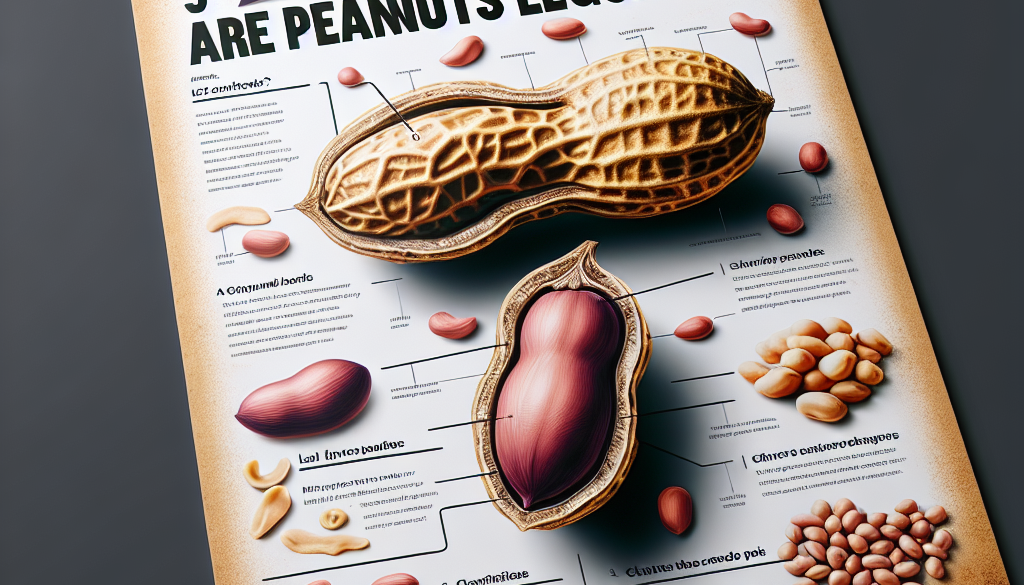Are Peanuts Legumes? Nutty Fact Revealed
-
Table of Contents
- Peanuts as Legumes: Unveiling the Nutty Truth
- Understanding the Botanical Basics
- Peanuts: A Legume in Disguise
- Nutritional Profile of Peanuts
- Dietary Considerations and Allergies
- Peanuts in Agriculture and Economy
- Conclusion: Embracing the Legume Identity
- Discover ETprotein’s Plant-Based Protein Products
Peanuts as Legumes: Unveiling the Nutty Truth

When it comes to peanuts, there’s a common misconception that they belong to the nut family. However, the truth is more complex and fascinating than many might expect. In this article, we’ll delve into the botanical classification of peanuts, explore their nutritional profile, and reveal why they are, in fact, legumes. We’ll also examine the implications of this classification for dietary considerations and agricultural practices.
Understanding the Botanical Basics
Botanically speaking, the classification of plants is based on specific characteristics that determine their family and species. To understand where peanuts fit in, it’s essential to grasp the difference between nuts and legumes.
- Nuts: True nuts are hard-shelled pods that contain both the fruit and seed of the plant, where the shell does not open to release the seed. Examples include acorns and chestnuts.
- Legumes: Legumes are a type of fruit known as a pod, which contains seeds that can be eaten. These pods typically split open along two seams when the fruit is mature. Common legumes include beans, lentils, and peas.
With this distinction in mind, let’s examine the peanut’s place in the plant kingdom.
Peanuts: A Legume in Disguise
Peanuts, scientifically known as Arachis hypogaea, are indeed legumes. They grow underground, unlike tree nuts such as almonds, walnuts, and cashews. The peanut plant flowers above ground, but after pollination, the flower stalk elongates and bends towards the ground, burying the fertilized ovary. The peanut matures underground, enclosed in a thin shell that is characteristic of legumes.
Nutritional Profile of Peanuts
Peanuts are not only a delicious snack but also a powerhouse of nutrition. They are rich in protein, healthy fats, vitamins, and minerals. Here’s a closer look at their nutritional benefits:
- Protein: Peanuts are an excellent source of plant-based protein, making them a great option for vegetarians and vegans.
- Healthy Fats: They contain monounsaturated and polyunsaturated fats, which are beneficial for heart health.
- Fiber: Peanuts are high in dietary fiber, which aids in digestion and promotes a feeling of fullness.
- Vitamins and Minerals: They are rich in B vitamins, vitamin E, magnesium, phosphorus, and potassium.
Given their nutrient-dense profile, peanuts can be a valuable addition to a balanced diet.
Dietary Considerations and Allergies
Understanding that peanuts are legumes is crucial for dietary planning, especially for individuals with specific dietary restrictions or allergies. For those with nut allergies, peanuts may still pose an allergenic risk, despite not being true nuts. It’s important to consult with healthcare providers to understand individual sensitivities.
For those following a legume-free diet, such as certain paleo diets, peanuts would be excluded along with other legumes. Conversely, vegetarians and vegans often include peanuts in their diets for their high protein content.
Peanuts in Agriculture and Economy
The classification of peanuts as legumes also has significant implications for agriculture and the economy. As legumes, peanuts have the unique ability to fix nitrogen in the soil, which reduces the need for chemical fertilizers and promotes soil health. This characteristic makes peanuts an important crop in crop rotation practices.
Economically, peanuts are a valuable crop in many countries. They are used in a variety of products beyond peanut butter, including oils, flours, and animal feed. The versatility and demand for peanuts contribute to their economic significance.
Conclusion: Embracing the Legume Identity
In conclusion, the revelation that peanuts are legumes rather than true nuts is more than a trivial fact. It affects dietary choices, agricultural practices, and economic considerations. Peanuts’ rich nutritional profile and their role in sustainable farming practices underscore their importance in both our diets and the environment.
Whether you’re snacking on a handful of peanuts, enjoying a spoonful of peanut butter, or incorporating them into a meal, you’re partaking in the benefits of a versatile and nutritious legume.
Discover ETprotein’s Plant-Based Protein Products
If you’re looking for high-quality plant-based protein options, consider ETprotein’s range of products. Their selection includes organic rice protein, clear rice protein, pea protein, clear pea protein, pumpkin seed protein, sunflower seed protein, mung bean protein, and peanut protein. These products are non-GMO, allergen-free, and have a neutral taste, making them suitable for various industries and dietary needs.
ETprotein’s commitment to quality and customer satisfaction makes them a top choice for anyone seeking plant proteins. Whether you’re a distributor, trader, or manufacturer in the food and beverage or nutraceutical sectors, ETprotein can meet your protein requirements with their extensive product range.
About ETprotein:
ETprotein, a reputable protein Chinese factory manufacturer and supplier, is renowned for producing, stocking, exporting, and delivering the highest quality organic bulk vegan protein and plant proteins. They include Organic rice protein, clear rice protein, pea protein, clear pea protein, pumpkin seed protein, sunflower seed protein, mung bean protein, peanut protein etc. Their offerings, characterized by a neutral taste, non-GMO, allergen-free attributes, cater to a diverse range of industries. They serve nutraceutical, pharmaceutical, cosmeceutical, veterinary, as well as food and beverage finished product distributors, traders, and manufacturers across Europe, USA, Canada, Australia, Thailand, Japan, Korea, Brazil, and Chile, among others.
ETprotein specialization includes exporting and delivering tailor-made protein powder and finished nutritional supplements. Their extensive product range covers sectors like Food and Beverage, Sports Nutrition, Weight Management, Dietary Supplements, Health and Wellness Products, and Infant Formula, ensuring comprehensive solutions to meet all your protein needs.
As a trusted company by leading global food and beverage brands and Fortune 500 companies, ETprotein reinforces China’s reputation in the global arena. For more information or to sample their products, please contact them and email sales(at)ETprotein.com today.














